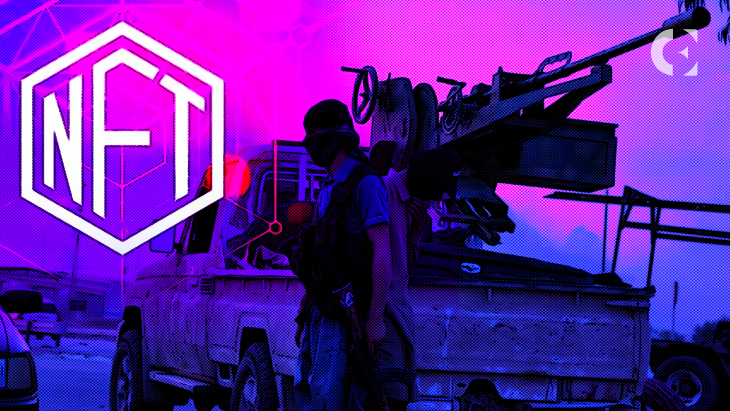- ISIS enlists NFTs to fundraise, recruit, and spread terror.
- The NFTs were initially featured in OpenSea and Rarible before they were removed.
- Nonetheless, the NFTs still continue to circulate across the internet.
Leading NFT marketplaces such as OpenSea and Rarible delisted a collection of NFTs that glorified the Islamic State’s (ISIS) propaganda, citing their “zero-tolerance policy for entries that promote hate and terrorism.” A “terrorist sympathizer” created and minted those NFTs.
A former US intelligence official gauged that the purpose of creating these NFTs was to raise funds, recruit, and spread terror across nations while congratulating the group for its recent attack against the Taliban in Afghanistan, which killed 21 people.
The collection consists of three NFTs, including one bearing the logo of ISIS; another depicting a man in a gas mask apparently making explosives; and another depicting a comparison shot of a cigarette against a toothbrush to discourage smoking, which is prohibited under the Islamic State rule.
Although these NFTs have been removed from the marketplaces, due to the decentralized nature of NFTs, it is practically impossible to remove them from the internet, and they continue to exist due to their respective blockchains. All that is required to access and circulate these NFTs is knowledge of their specific addresses.

In the process of misusing technology originally designed for tracking, valuing, and trading digital assets, these NFTs have exacerbated fear of ISIS’ potential resurrection via the funds raised. Despite this being the first terror-based NFT created by a supporter, the question raised by regulators and national-security officials is about how this decentralized technology may benefit terror groups in the future.
The Justice Department and other law-enforcement organizations believe it was a hint that the Islamic State and other terrorist groups may be prepared to evade Western attempts to cut off their internet funding and to messaging via the nascent financial technology.
A senior US intelligence officer reiterated that it is a sign that ISIS and other terrorist organizations, arms dealers, corrupt governments, drug cartels, and other illicit entities are on the verge of misusing the new technology as a means of fundraising and contraband sales.
In contrast, Taliban officials last month banned crypto in Afghanistan and arrested 16 local crypto exchanges on the grounds that digital currencies are “new” and “the people don’t know what they are,” making them easy to scam. Meanwhile, Israeli authorities confiscated 30 cryptocurrency wallets from 12 profiles linked to the Gaza-based terror organization — Hamas, earlier this year.
Disclaimer: The information presented in this article is for informational and educational purposes only. The article does not constitute financial advice or advice of any kind. Coin Edition is not responsible for any losses incurred as a result of the utilization of content, products, or services mentioned. Readers are advised to exercise caution before taking any action related to the company.









